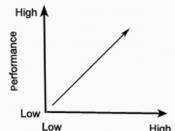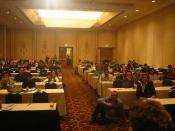Running head: SOCIAL FACILTATION OF COMPLEX TASKS
Social Facilitation of Complex Tasks: A Comparison of Zajonc's Drive Theory and Cottrell's Evaluation-Apprehension Theory
Abstract
Zajonc (1965) describes Drive Theory as the increase in levels of arousal in the presence of others which enhances the frequency of dominant behaviours. The aim of this experiment was to challenge Zajonc's theory. This study encompassed ten University students and ten teachers and examined the effect of an Attentive Audience condition compared to Mere Presence condition on the performance of a complex word task. No significant difference was found between both conditions in the mean number of words obtained. This study supports Zajonc's (1965) Drive Theory as the most reliable indicator in determining individual's behaviour in the presence of others.
A major area of social psychology is the study of an individual's behaviour in the presence of others. This is defined as Allport's Theory of Social Facilitation (Vaughan, 2002).
The effect of others on an individual's behaviour is addressed by the opposing theories of Zajonc's (1965) Drive Theory that defines Mere Presence and Cottrell's (1972) Evaluation Apprehension Model that characterizes Attentive Audience.
Allport's theory was further delineated by the theorist Zajonc in his Drive Theory. Plantania and Morgan (2001, p.190) explain Drive Theory as "the presence of others that produces increments in levels of arousal which in turn enhances the frequency of dominant responses (i.e., responses with the greatest habit strength)." Zajonc places emphasis on an innate stimulation effect in the presence of a non-specific, non-directional other (Markus, 1978). Mere Presence is the presence of a person in the same area as another person performing a task. The Mere Presence individual is either performing the same task but not interacting, or coexists with the other person without interest or interaction (Vaughan, 2002).
A number of researchers...



Good
an essay that shows depth of knowledge
0 out of 0 people found this comment useful.